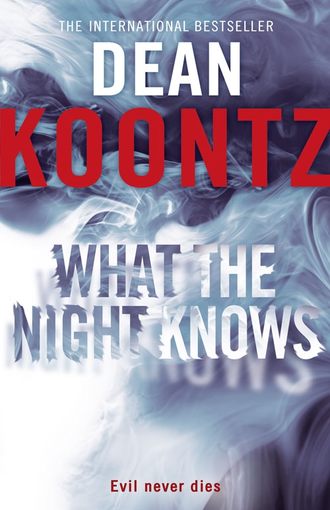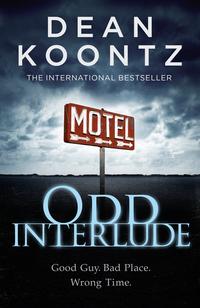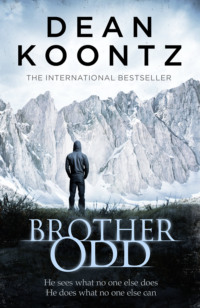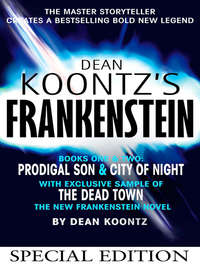
Полная версия
What the Night Knows
He stepped to the passenger side, which likewise revealed no damage, and got down on one knee to peer beneath the car. Nothing sagged from the undercarriage, nothing leaked.
The knock had been too loud and too forceful to have been of no importance.
He raised the hood, but the engine compartment revealed no obvious problem.
Perhaps his wife, Nicolette, had stowed something in the trunk, and it had fallen over. He leaned in through the open driver’s door, switched off the engine, and plucked the keys from the ignition. When he unlocked the trunk, he found it empty.
Behind the wheel, he started the engine again. The thump and shudder were not repeated. All seemed well.
He drove away, under the dripping limbs of the purple beeches, off the grounds of the state hospital, and more than a mile along the county road before he found a section of the shoulder wide enough to allow him to park well clear of the pavement. He left the engine running but switched off the windshield wipers.
The car seat had power controls. He put it back as far as it would go from the steering wheel.
He had stopped in a rural area, flat fields to the left of the highway, a rising meadow to the right. On the slope were a few oak trees, almost black against the tall pale grass. Nearer, between the shoulder of the road and the meadow, stood a ramshackle split-rail fence, waiting for wood rot and weather to bring it down.
A skirling wind shattered rain against the car windows on every side. Beyond the streaming glass, the country scene melted into the amorphous shapes of a dreamscape.
As a detective, John was a cabinetmaker. He started with a theory just as a cabinetmaker started with scale drawings. He built his case with facts as real as wood and nails.
A police investigation, like crafting fine cabinetry, required dimensional imagination and much thought. After interviews, John’s habit was to find a quiet place where he could be alone to think about what he’d learned while it remained fresh in his mind, and to determine if any new clues dovetailed with old ones.
His laptop computer rested on the passenger seat. He opened it on the console.
Days ago, he had downloaded and saved the 911 call that Billy had placed on that bloody night. John replayed it now:
“You better come. They’re all dead.”
“Who is dead, sir?”
“My mother, father, grandmother. My sister.”
“Who is this?”
“Billy Lucas. I’m fourteen.”
“What’s your address there?”
“You know it already. It came up on your screen when I called.”
“Have you checked them for signs of life?”
“Yes, I checked them very closely for signs of life.”
“Have you had any first-aid training?”
“Trust me, they’re dead. I killed them. I killed them hard.”
“You killed them? Son, if this is a prank—”
“This isn’t a prank. The prank is over. I pranked them all. I pranked them good. Come see how I pranked them. It’s a beautiful thing. Good-bye now. I’ll be waiting for you on the front porch.”
Along the county road came two vehicles behind headlights. Seen through the smeared and misted windows, through the deluge, they had little detail and resembled bathyscaphes motoring through an oceanic trench.
As John watched the traffic pass, the puddled blacktop blazing in their beams, bright reflections coruscating along his streaming windows, the afternoon was further distorted and made strange. He was plagued by confusion, disconcerted to find himself – a man of reason – wandering in a fog of superstition.
He felt adrift in space and time, memory as valid as the moment.
Twenty years earlier and half a continent from here, four people had been murdered in their home. The Valdane family.
They had lived less than a third of a mile from the house in which John Calvino was raised. He knew them all. He went to school with Darcy Valdane and nursed a secret crush on her. He’d been fourteen at the time.
Elizabeth Valdane, the mother, was stabbed with a butcher knife. Like Sandra Lucas, Billy’s mother, Elizabeth had been found dead in her kitchen. Both women were wheelchair-bound.
Elizabeth’s husband, Anthony Valdane, was brutally bludgeoned with a hammer. The killer left the claw end of the implement embedded in the victim’s shattered skull – as Billy, too, had left the hammer in his father’s head.
Anthony had been attacked while sitting at the workbench in his garage; Robert Lucas had been clubbed to death in his study. As the hammer arced down, Anthony was building a birdhouse; Robert was writing a check to the electric company. Birds went homeless, bills went unpaid.
Victoria, Elizabeth Valdane’s sister, a widow who lived with them, had been punched in the face and strangled with a red silk scarf. Ann Lucas, Billy’s grandmother, a recent widow, was punched and subsequently strangled with such ferocity that the scarf – red this time, too – cut deep into her throat. The women’s relationships to their families were not identical, but eerily similar.
Fifteen-year-old Darcy Valdane endured rape before being stabbed to death with the same butcher knife used on her mother. Twenty years later, Celine Lucas, sixteen, was raped – and then butchered with the same blade used on her mother.
Darcy had suffered nine knife wounds. Celine, too, was stabbed nine times.
Then I stabbed her precisely nine times …
Why did you say “precisely”?
Because, Johnny, I didn’t stab her eight times, and I didn’t stab her ten. Precisely nine.
In both cases, the order of the murders was the same: mother, father, widowed aunt/grandmother, and finally the daughter.
John Calvino’s laptop directory contained a document titled “Then-Now,” which he had composed over the past few days, listing the similarities between the Valdane-family and the Lucas-family murders. He didn’t need to bring it to the screen, for he had committed it to memory.
A flatbed truck, transporting a large and arcane piece of farm machinery, roared past, casting up a spray of dirty water. In the murky light, the machine looked insectile and prehistoric, furthering the quality of unreality that characterized this drowned afternoon.
Cocooned in his car, as wind ceaselessly spun filaments of rain around it, John considered the faces of two murderers that phased like moons through his mind’s eye.
The Lucas family had been destroyed by one of their own, by handsome blue-eyed Billy, honor student and choirboy, his features smooth and innocent.
The Valdanes, who had no son, were murdered by an intruder whose looks were less appealing than those of Billy Lucas.
That long-ago killer had committed additional atrocities against three other families in the months that followed the Valdane murders. During the last of those crimes, he’d been shot to death.
The journal that he left behind, hundreds of handwritten pages, suggested that he had killed often prior to the Valdanes, generally one victim at a time. He didn’t name them or say where those murders were committed. He didn’t care to brag – until he started to kill entire families and felt that his work was then worthy of admiration. Aside from the story of his detestable origins, the journal consisted mostly of a demented philosophical ramble about death with a lowercase d and about what it was like to be Death with an uppercase D. He believed he had become “an immortal aspect” of the grim reaper.
His true name was Alton Turner Blackwood. He had lived under the false name Asmodeus. Itinerant, he had traveled ceaselessly in a series of stolen vehicles or hobo-style in boxcars, or sometimes as a ticketed passenger on buses. A vagrant, he slept in whatever vehicle he currently possessed, in abandoned buildings, in homeless shelters, in culverts and under bridges, in the backseats of twisted wrecks in automobile junkyards, in any shed left unlocked, once in an open grave covered by a canopy raised for a morning burial service, and secretly in church basements.
He stood six feet five, scarecrow-thin but strong. His hands were immense, the spatulate fingers as suctorial as the toe discs of a web-foot toad. Large bony wrists like robot joints, orangutan-long arms. His shoulder blades were thick and malformed, so that bat wings appeared to be furled under his shirt.
After each of the first three families had been savaged, Alton Blackwood had rung 911, not from the site of the murders, but from a public phone. His vanity required that the bodies be found while they were fresh, before the flamboyant process of decomposition upstaged his handiwork.
Blackwood was long dead, the four cases were closed, and the crimes occurred in a small city with inadequate protocols for the archiving of 911 calls. Of the three messages the killer had left, only one remained, regarding the second family, the Sollenburgs.
The previous day, John had solicited a copy of the recording, ostensibly as part of the Lucas investigation, and had received it by email as an MP3 file. He had loaded it into his laptop. Now he played it again.
When Blackwood spoke in an ordinary volume, his voice was a rat-tail file rasping against a bar of brass, but in the 911 calls, he spoke sotto voce, evidently to foil identification. His whisper sounded like an utterance by the progeny of snake and rat.
“I killed the Sollenburg family. Go to 866 Brandywine Lane.”
“Speak up please. Say again.”
“I’m the same artist who did the Valdane family.”
“I’m sorry. I’m not hearing you clearly.”
“You can’t keep me on the line long enough to find me.”
“Sir, if you could speak up—”
“Go see what I’ve done. It’s a beautiful thing.”
In his 911 call, Billy Lucas had said, Come see how I pranked them. It’s a beautiful thing.
To any police detective, the similarities between these two crimes, committed twenty years apart, would suggest that Billy Lucas read about Alton Turner Blackwood’s murder spree and imitated it as an homage to the killer.
But Billy had not mentioned Blackwood. Billy said not one word about his inspiration. Of motive, he said only Ruin.
Thunder came and went, thunder with lightning and without. A few cars and trucks seemed to float past as if awash in a flood.
The state hospital was an hour’s drive from the city, where John lived and where he had an appointment to keep before he went home. He powered the driver’s seat forward, switched on the windshield wipers, released the hand brake, and put the Ford in gear.
He didn’t want to think what he was thinking, but the thought was a sentinel voice that would not be silenced. His wife and his children were in grave danger from someone, something.
His family and two others before it were at risk, and he did not know if he could save any of them.
Chapter 5
Using two spoons, Marion Dunnaway scooped dough from the steel mixing bowl, deftly shaped it into a ball, and deposited it on the baking sheet, where eight others were arranged in rows.
“If I’d ever had children and now had grandchildren, I’d never let them near the Internet unless I was sitting beside them.”
She kept a tidy kitchen. Yellow-and-white curtains framed a view of the storm and seemed to bring order even to the chaotic weather.
“There’s too much sick stuff too easily accessed. If they see it when they’re young, the seed of an obsession might be planted.”
She scooped up more dough, spoon clicked against spoon, and a tenth cookie-to-be appeared almost magically on the Teflon sheet.
Marion had retired from the army after serving thirty-six years as a surgical nurse. Short, compact, sturdy, she radiated competence. Her strong hands attended to every task with brisk efficiency.
“Say a boy is just twelve when he comes across such trash. The mind of a twelve-year-old is highly fertile soil, Detective Calvino.”
“Highly,” John agreed from his chair at the dinette table.
“Any seed planted in it is likely to thrive, which is why you have to guard against an ill wind that might blow in a weed pip.”
Under a helmet of thick white hair, Marion’s face was that of a fifty-year-old, though she was sixty-eight. Her smile was sweet, and John suspected her laugh would be hearty, though he doubted that he would ever hear it.
Warming his hands around his coffee mug, he said, “You think that’s what happened to Billy – some weed pip from the Internet?”
Having pressed an eleventh ball of dough to the baking sheet, she said nothing as she shaped the final cookie in the batch.
Then she raised her face to the window, staring toward the house next door. John assumed she was seeing beyond that place, imagining the house two doors away – the Lucas residence, the house of death.
“Damned if I know. They were a solid family. Good people. Billy was always polite. The nicest boy. So very considerate of his mother after the accident that put her in the wheelchair.”
She opened the oven. With a quilted mitt, she took out a tray of finished cookies and put it on the sinkside cutting board to cool.
A flood of hot air poured the aromas of chocolate and coconut and pecans through the kitchen. Curiously, instead of making John’s mouth water, the smell briefly nauseated him.
Marion said, “I served in field hospitals, battle zones. Frontline emergency surgeries. Saw a lot of violence, too much death.”
She slid the tray of neatly arranged dough balls into the oven, closed the door, and took off the quilted mitt.
“I got so I could tell at first sight which ones would survive their wounds, which wouldn’t. I could see death in their faces.”
From a drawer near the refrigerator, she extracted a key and brought it to the table.
“I never saw death in Billy. Not a glimpse of it. The Internet theory is just twiddle-twaddle, Detective Calvino. Just the jabber of an old woman who’s afraid to admit some evil can’t be explained.”
She gave him the key, which dangled from a beaded chain with a plastic cat charm. The cat was a grinning golden tabby.
Billy’s parents loved cats. They’d had two spayed British spotted shorthairs, green-eyed and frisky, named Posh and Fluff.
When the killing started, Posh and Fluff fled through a cat flap in the kitchen door. A neighbor, at the house across the street from the Lucases, found them shivering and crying under his back porch.
Pocketing the key, John rose. “Thank you for the coffee, ma’am.”
“I should have thought to turn the key in the day it happened.”
“No harm done,” he assured her.
Wondering if the Lucases might have traded house keys with a trusted neighbor, John had that morning made four cold calls before hearing what he hoped to hear from Marion Dunnaway.
“Let me give you some cookies for those kids you mentioned,” she said. “The earlier batches are cool.”
He sensed that he would disappoint her if he declined.
She put six cookies in a OneZip bag and escorted John to the front door. “I think of going up there to see Billy one day, if he’s allowed visitors. But what would I say?”
“Nothing. There’s nothing to say. You’re better off remembering him as he was. He’s very different now. You can do nothing for him.”
He had left his raincoat on the front-porch swing. He shrugged into it, put up the hood, went to his car at the curb, and drove two doors east to the Lucas house, where he parked in the driveway.
Perhaps an hour of daylight remained before the rain washed darkness down the day.
Fat snails, with eye stalks questing, crossed the wet front walkway, venturing from one grassy realm to another. John avoided crushing them underfoot.
To accommodate Sandra Lucas in her wheelchair, the porch offered both steps and a ramp.
He took off his raincoat, shook it, and folded it over his left arm because the only other place to put it was a glider with stained yellow cushions. After Billy finished with his sister and called 911, he had come to the front porch and had sat on the glider, naked and drenched in blood.
In most jurisdictions, after attaining the age of fourteen, children are presumed to have sufficient capacity to form criminal intent. Neither moral nor emotional insanity – as distinguished from mental – exempts the perpetrator from responsibility for his crimes.
To the first two police officers on the scene, Billy offered his sister for ten dollars each and told them where she could be found. “Just leave twenty bucks on the nightstand,” he said. “And don’t have a cigarette after. This house is a no-smoking zone.”
Now the police-department seal had been peeled off the front door. Two days previously, long after the criminalists collected trace evidence and prints, after a review of that evidence supported Billy’s confession in every detail, after the boy was evaluated by psychiatrists, and after he was remanded to the state hospital under a preliminary finding of insanity to be reaffirmed or reconsidered in sixty days, the house ceased to be an active crime scene.
No one from the department would have come by merely to remove the seals from the exterior doors. Because the Lucases had no family nearby, perhaps an attorney, serving as executor, had been here to review the condition of the house.
John used the key with the dangling cat charm. He went inside, closed the door, and stood in the foyer, listening to this home that had become a slaughterhouse.
He possessed no authority to enter these premises. Technically, the case file remained open until Billy could be evaluated in sixty days, but the investigation was inactive. Anyway, this had never been John’s assignment.
If he’d been unable to discover a neighbor with a key, his only alternative would have been to force entry. He would have done it.
With his back against the front door, he sensed that someone waited for him in one of the surrounding rooms, but this was a false perception. In other murder houses, after the bodies were removed and the evidence collected, when he returned alone to consider the scene in solitude, he usually experienced this disturbing impression of a presence looming, but it always proved to be unfounded.
Chapter 6
Thunder no longer roared, and the rain subsided from drumming torrents to a drizzle too soft to press a whisper through the walls.
According to the real-estate records at the county assessor’s office, the residence had six main rooms on the ground floor, five on the upper level. As John stood in the dusky foyer, the house felt larger than described. The hollow silence had a quality of vastness, as of caverns coiling countless miles through deep strata of stone.
Eight-pane sidelights flanked the front door, but the mummified sun, enwrapped by sodden clouds, would soon be setting.
He waited for his eyes to adjust to the gloom. He intended to turn on as few lights as possible.
Sometimes the visible aftermath of violence so disturbed him that he couldn’t properly work the scene. One gang thug capping another in a territorial dispute never fazed him. An investigation involving a murdered family brought him to the brink.
He wasn’t here in an official capacity. This was personal. Therefore, shadows wouldn’t hamper him. Shadows soothed.
Compassion and pity were desirable in a homicide detective. In some cases, however, a capacity for intense empathy tended to depress and to discourage rather than to motivate.
In spite of his sometimes anguished identification with victims, John could have been nothing but what he was. He became a detective not because he thought the job glamorous or because the benefits were generous. He felt compelled to follow that path. His career became a necessity; no alternative existed either in thought or in fact.
Ahead, on the left, a gray glow might have defined an archway to a living room. Above, a window on the stairwell landing admitted just enough daylight to suggest a handrail, balusters.
Soon his dark-adapted eyes identified the newel post at the foot of the stairs. He draped his raincoat over it.
From an inner sport-coat pocket, he produced a compact LED flashlight, but he did not at once switch it on.
He wasn’t seeking nuances of crime-scene conditions critical to a prosecution. The premises had been well-tramped; what evidence once existed had been gathered or contaminated, or obliterated.
What he sought was more ephemeral this time, more elusive: a keener intuition than the one on which he currently operated, some insight, some revelation, an enlightenment that would either confirm or put to rest his hunch that the Lucas family would be only the first of four to be massacred.
John followed the dark hall to the kitchen, where the door and casing had been removed to accommodate a wheelchair. The windows were curtained with translucent fabric that filtered the dismal light.
A rancid smell halted him one step past the threshold.
The flashlight fanned a wheelchair near the breakfast bar, the chair in which Billy’s mother died when he slammed the knife through her throat.
Now on the floor in front of the fridge, the LED beam revealed the source of the odor. A quart of spilled milk marbled with the mother’s blood had congealed into a yellow-and-purple scum peppered with patches of mold. The mess glistened, still not entirely dry.
According to Billy’s confession, his mother tried to scream but couldn’t raise more than a rasp-and-rattle, a whistling wheeze. She could not summon the help of other family members – or warn them.
As if those sounds had been recorded on the walls, John heard them, imagined in his mind’s ear but as real to him as the thunder earlier and as his wife’s voice would be when he went home to her.
Sandra Lucas had been disabled in a traffic accident. She coped elegantly with her new circumstances but also volunteered to counsel others in her condition. She gave motivational speeches stressing the importance of family, the strength a spouse could provide, and the reward of being an example of grace and courage for your children.
She bled to death, but drowned, too, from aspirated blood.
The radiant green numerals in the digital clock on the oven had displayed the correct time. Now, inexplicably, the numerals began to flash midnight or noon.
Maybe the electrical service failed for a moment, requiring that the clock be reset. Because he had not switched on any house lights, he wouldn’t have been aware of a brief power outage.
He watched the numbers flashing. He watched them and wondered.
The rancid odor seemed to intensify.
After backing away from the odor but not all the way out of the past into the present, John went next to the study. Here, Robert Lucas had been bludgeoned with a hammer while paying bills.
Robert’s desk was along the far wall, facing a window, so that he could look up from his work to enjoy a view of the three paper birches in the yard. This put his back to the study door.
Darkness shrank from the flashlight beam, and a collage appeared on top of the desk: an artful scattering of envelopes, invoices, and a sheet of postage stamps against a desk-blotter background, all of it unevenly glazed with a lacquer once bright red, now red-black and rust and purple.
In his audio imaginarium, John Calvino heard nothing of Robert’s death cries, perhaps because the first blow had rendered the man unconscious before a sound could escape him.
The flashlight found a spattered pen set on a white marble base, a sprayed windowsill, spotted draperies. The spatter, the spray, and the spotting comprised a kind of scream, a shrill shriek that seemed to arise in John’s bones, but this was not a sound that had been made by the victim; this was his own unvoiced cry of moral revulsion.







